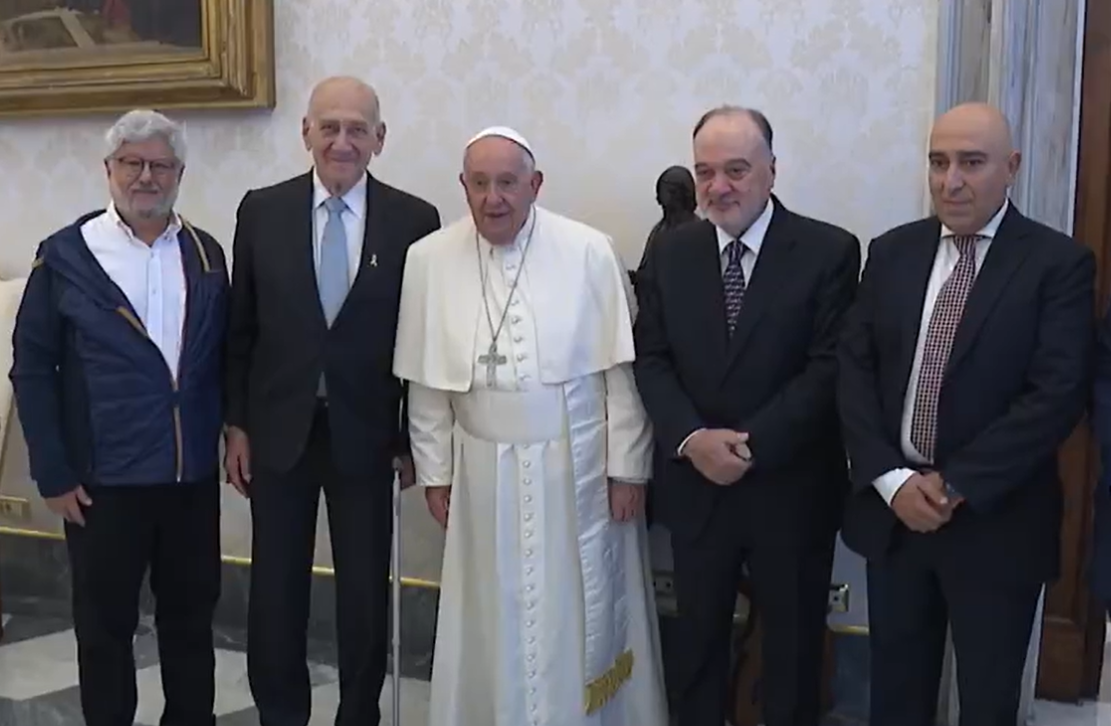Olmert and Al-Kidwa meet Francis, bring their peace plan for Israel and Palestine
A former Israeli prime minister and a former Palestinian ambassador to the UN recently issued a joint appeal to resume negotiations for the two states and a political solution for Gaza. The pope received them in audience at the Vatican together with Gershon Baskin (Israeli negotiator with Hamas) and Samer Sinijlawi (a Palestinian very close to Mohammad Dahlan) just as the Israeli government claims to have killed Hamas leader Yahya Sinwar.
Vatican City (AsiaNews) – Pope Francis met this morning, at the Vatican, a former prime minister of Israel, a former foreign minister of the Palestinian Authority and nephew of Yasir Arafat, an Israeli academic known for having negotiated in the past with Hamas the release of hostages, and a Palestinian activist considered very close to Mohammad Dahlan, a former "rival" of Mahmud Abbas, expelled from Fatah in 2011 and who has been living "in exile" in the United Arab Emirates since then with the support of Sheikh Mohamed Bin Zayed of Abu Dhabi.
“This morning, the Holy Father Francis received in audience, [. . .] Mr. Ehud Olmert, former Prime Minister of Israel, Mr. Nasser Al-Kidwa, former Foreign Minister of Palestine, Mr. Gershon Baskin, and Mr. Samer Sinijlawi,” reads the press release by the Vatican Press Office.
As is customary for meetings that do not involve heads of state or government, no official information has been given on the contents of this meeting, but the very fact that it happened as it did sends a very important message from the pontiff amid a war that caused rivers of blood to flow in the Middle East for more than a year.
The four men are linked by a common thread: They have spoken out in favour of a ceasefire, the release of hostages, and restarting a negotiated solution to the Israeli-Palestinian conflict.
Alongside his repeated appeals, Pope Francis has encouraged such rapprochements to turn the page on the endless violence between the two peoples.
He did so publicly in May, at the Verona arena, when he publicly embraced Maoz Inon, an Israeli entrepreneur, who lost his parents in the massacre carried out by Hamas on 7 October, and Azia Abu Sarah, his Palestinian colleague, who was also personally affected by the loss of a loved one due to the conflict.
But today's audience shifts attention from the personal to the political quest for solutions.
The presence of Ehud Olmert is a major fact. A political heir to Ariel Sharon, he served 16 months in prison in 2016 on corruption charges linked to his long tenure as mayor of Jerusalem in the 1990s.
He is also the last Israeli prime minister to have negotiated with the Palestinian Authority on a solution to the conflict in 2009. And for years he has been one of Israel’s most vociferous critics of Benjamin Netanyahu, once a party colleague in the Likud.
Earlier this month, Olmert and Nasser Al-Kidwa, who served as Palestinian representative at the UN (1991-2005) and later foreign minister of the Palestinian National Authority for a year, launched on the pages of some major international newspapers their own peace plan based on the creation of a Palestinian state.
The idea has remained substantially the same over the years. The 1967 borders are a reference point, Jerusalem as a shared capital, exchanges of territory between the two states (for an area equivalent to 4.4 per cent of the West Bank) to allow Israel to annex the most populous settlements near the Green Line to be compensated with other areas now in Israeli territory.
As for Gaza, the Olmert-Al-Kidwa plan proposes to place it under a Council of Commissioners, made up of professional Palestinian technocrats linked to the Palestinian Authority, to lead the transition to elections to be held within two or three years.
The Council would be aided by a Temporary Arab Security Presence (a peacekeeping contingent made up of troops from Arab countries) whose deployment would be coordinated with the withdrawal of Israeli forces.
Although the two figures no longer play any role in government, their plan represents an attempt to revive the so-called Track II diplomacy at such a tragic time, whereby individuals without governmental responsibilities try to jumpstart talks between the two sides.
Right now, this may seem a distant prospect, but by meeting them in the Vatican, Pope Francis is trying to encourage it.
Meanwhile, the Israeli government today announced that there is a “high likelihood" that Yahya Sinwar, the leader of Hamas who masterminded the 7 October massacres, was killed in Gaza.
This is another crossroads in this conflict with political leaders extolling their military achievements, but continue to lack the courage to tell their peoples a single word about the aftermath.
07/05/2025 23:19







.png)










